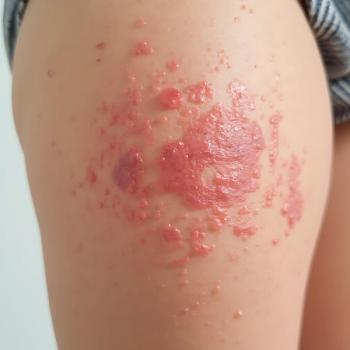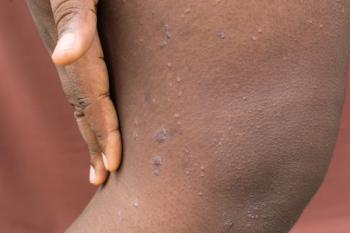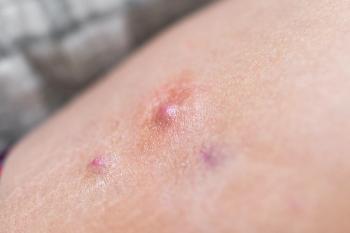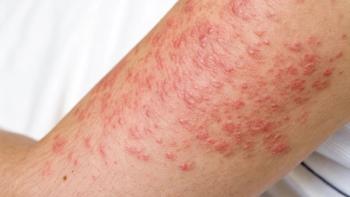
Current guidelines suggest limiting diagnostic testing for chronic spontaneous urticaria when no clear cause is suspected, though biomarkers and biopsies are emerging as tools to predict treatment response and personalize care.

Cameron Santoro is an associate editor for The American Journal of Managed Care® (AJMC®), AJMC.com, and The Center for Biosimilars®.

Current guidelines suggest limiting diagnostic testing for chronic spontaneous urticaria when no clear cause is suspected, though biomarkers and biopsies are emerging as tools to predict treatment response and personalize care.

Tyler Sandahl, PharmD, a clinical pharmacist at Mayo Clinic, explains that sequencing novel multiple myeloma therapies with CAR T-cell therapy is generally prioritized first for eligible patients, while bispecific antibodies are reserved for later lines or for patients unable to tolerate CAR T.

Tyler Sandahl, PharmD, a clinical pharmacist at Mayo Clinic, discussed the complexities of alternative payment models for chimeric antigen receptor T-cell and bispecific therapies and the need for improved data sharing in cancer care.

Both regulatory-approved and pipeline treatments for moderate to severe hidradenitis suppurativa demonstrate comparable efficacy and safety, offering hope for patients often dissatisfied with current treatment options.

Increasing environmental events driven by climate change and human activity exacerbate allergy and asthma conditions, further compounded by exposure to persistent pollutants like per-and polyfluoroalkyl substances and microplastics.

Reducing the use of oral corticosteroids in patients with severe asthma is a pressing concern due to their associated adverse effects, health care costs, and impact on quality of life.

Rising grocery prices are forcing most Americans to shift toward ultraprocessed foods, leading to increased health risks and exacerbating existing disparities, particularly among underserved communities.

For patients with obesity, clinicians should move beyond a "try and fail" approach to lifestyle interventions and prioritize weight management medication when it can deliver crucial cardiovascular benefits.

Dupilumab was approved by the FDA to treat bullous pemphigoid, that demonstrated its efficacy in achieving sustained disease remission and significantly improving symptoms like itch and disease severity in adults.

Nemolizumab significantly and safely improved itch and skin lesions for up to 2 years in patients with moderate to severe prurigo nodularis.

Topical ruxolitinib cream shows promise as a treatment for inflammatory skin conditions, but lacks consistent data, indicating a need for further research into its use across various dermatologic conditions.

Pediatric patients with hidradenitis suppurativa have a significantly increased prevalence of chronic medical and psychiatric comorbidities, highlighting the critical need for comprehensive screening and multidisciplinary care.

New data shows that barzolvolimab offers sustained complete responses and significantly improved quality of life for patients with chronic spontaneous urticaria, with a favorable safety profile.

For children with severe Crohn disease, upadacitinib offers an effective induction therapy, but its benefits must be carefully weighed against potential adverse events.

Vitiligo Awareness Month and World Vitiligo Day aim to educate the public about the autoimmune skin condition's complex epidemiology, subtypes, mental health impacts, and diverse treatments.

Specific protein signatures could predict a future diagnosis of Crohn disease and ulcerative colitis, potentially enabling earlier intervention and improving patient outcomes.

In the US, individuals die during pregnancy and the postpartum period at a greater and increasing rate than in any other high-income country.

African American and Latino older adults with Alzheimer disease and related dementias and their families are likely to face disproportionately high burdens, primarily associated with unpaid caregiving, suggesting the need for policies that may reduce economic burdens for all US residents.

Implementing LGBTQ+ inclusive language in patient care and clinical trials for dermatology could improve data accuracy, relevance, and patient-clinician relationships.

Gary Falcetano, PA-C, AE-C, explains that proactively managing seasonal allergies can significantly decrease the overall inflammatory burden, thereby improving both physical symptoms and potentially mitigating neuroinflammation's impact on mental well-being.

Gary Falcetano, PA-C, AE-C, features insights on how unaddressed chronic allergy symptoms contribute to mental health burdens and the critical role of early immunoglobulin E trigger identification in managing both physical and psychological wellbeing.

Adults with peanut allergy experienced effective treatment with peanut oral immunotherapy but future studies are necessary to confirm and characterize safety profiles among various subgroups.

Alopecia areata cases increased from 1990 to 2021, highlighting the need for further research into socioeconomic factors and disease burden.

Despite their profound sacrifices, veterans and active military members disproportionately face significant physical and mental health issues stemming from their service, with many struggling to access the affordable and comprehensive care they need.

Gary Falcetano, PA-C, AE-C, explained that chronic allergic inflammation can significantly affect brain chemistry and mood regulation.

Gary Falcetano, PA-C, AE-C, explains that spring allergies can contribute to spring-onset seasonal affective disorder, emphasizing the need for more research collaboration and for clinicians to address both physical and mental health in patients with allergies.

Significant differences in gut microbiome composition were found among pediatric patients with hidradenitis suppurativa, suggesting further investigation surrounding gut microbiome dysregulation.

Patients with vitiligo experience impacts on quality of life, emerging therapies offer promising prospects for more targeted and effective treatments, though further research is needed to confirm their safety, efficacy, and optimal use.

Air pollution significantly contributes to and worsens various dermatologic conditions through oxidative stress, inflammation, and disruption of the skin barrier.

A causal link between chronic spontaneous urticaria and gut microbiota, with metabolic pathways potentially acting as mediators, offer new avenues for research and clinical understanding.

259 Prospect Plains Rd, Bldg H
Cranbury, NJ 08512
© 2025 MJH Life Sciences®
All rights reserved.
